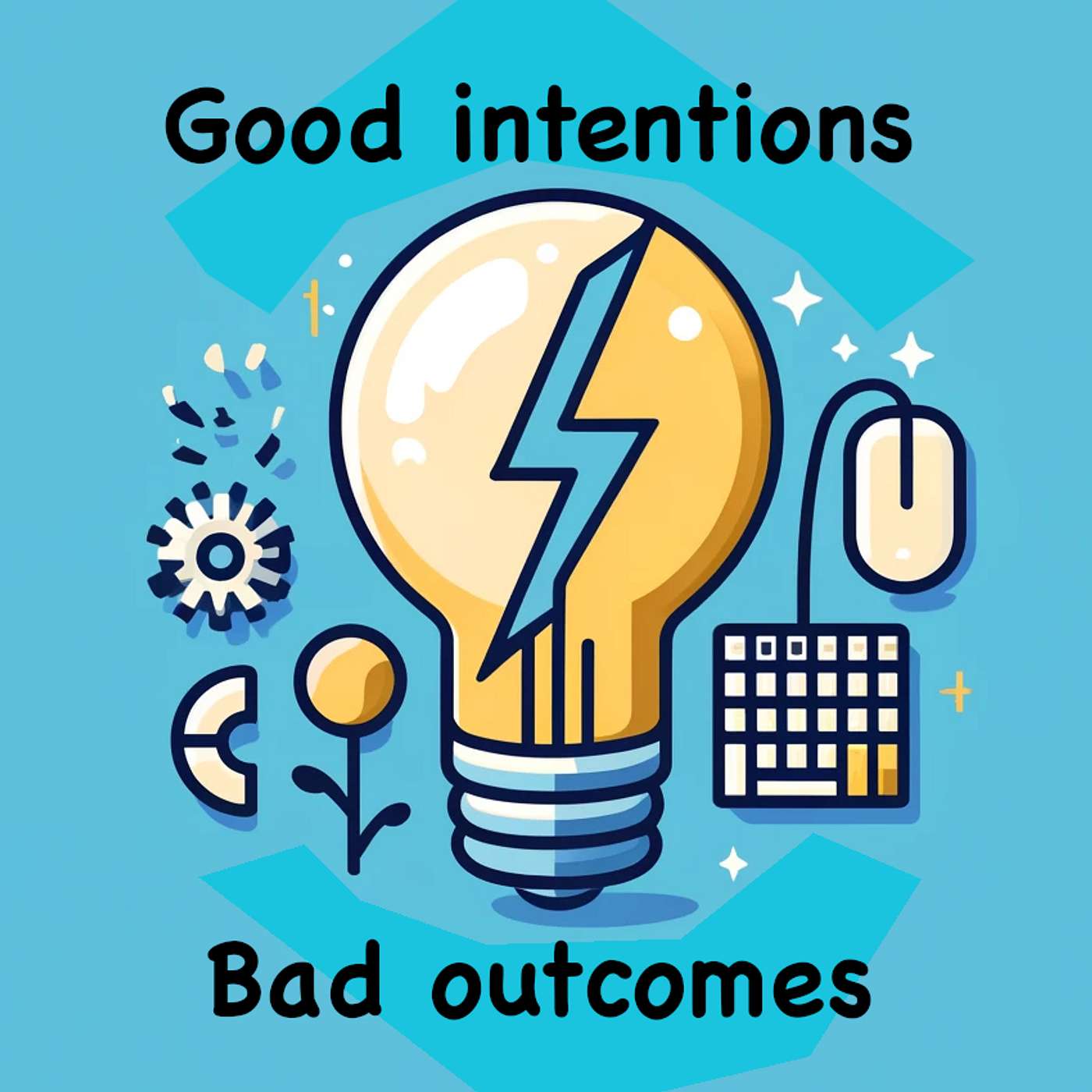Good intentions, bad outcomes
Local Optimization: Why Your Team's Success Might Be Slowing Down the Whole Company
Nov 25, 2025
Season 1
Episode 18
Xodiac
Are your teams working harder and faster but nothing is getting to production quicker?
You might be falling into the local optimization trap. In this episode of Good Intentions and Outcomes, we explore how optimizing one part of your system can accidentally slow down the entire organization. Wayne shares real-world examples from software delivery teams, IT departments, and QA processes where good intentions led to unexpected bottlenecks.
🎯 What You'll Learn:
- What local optimization is and why it happens
- Real examples of teams improving metrics while overall delivery slows
- The disconnect between deployment and release
- Why focusing on what's in front of you can blind you to bigger problems
- Practical techniques to see the whole system (value stream mapping, theory of constraints)
💡 Key Takeaway:
Sometimes you need to "de-optimize" one part to optimize the whole system.
Perfect for: Engineering managers, product owners, Agile coaches, DevOps teams, and anyone interested in systems thinking and organizational efficiency.
🔗 Have a workplace situation you'd like us to discuss? Let us know in the comments!
#LocalOptimization #SystemsThinking #AgileTransformation #DevOps #SoftwareDelivery
---
Good Intentions and Outcomes Podcast - Exploring workplace challenges where good intentions lead to unintended consequences.
Contact us at feedback@goodintentionsbadoutcomes.org
 Local Optimization: Why Your Team's Success Might Be Slowing Down the Whole Company
15:54
Local Optimization: Why Your Team's Success Might Be Slowing Down the Whole Company
15:54
 How Do We Actually Show Support as a Leader?
17:07
How Do We Actually Show Support as a Leader?
17:07
 The AWS Outage That Broke Half the Internet: Your Cloud Isn't as Safe as You Think
14:11
The AWS Outage That Broke Half the Internet: Your Cloud Isn't as Safe as You Think
14:11
 OKRs vs KPIs: Why Confusing Them Kills Your Goals
14:59
OKRs vs KPIs: Why Confusing Them Kills Your Goals
14:59
 When CI/CD Pipelines Enable Bad Decisions
10:24
When CI/CD Pipelines Enable Bad Decisions
10:24
 Why "Protecting" Your Team Actually Hurts Delivery (The Isolation Trap)
12:24
Why "Protecting" Your Team Actually Hurts Delivery (The Isolation Trap)
12:24
 Why Handing Teams OKRs Kills Motivation (And What to Do Instead)
10:52
Why Handing Teams OKRs Kills Motivation (And What to Do Instead)
10:52
 When Good Metrics Go Bad: The Hidden Dangers of Performance Targets
15:31
When Good Metrics Go Bad: The Hidden Dangers of Performance Targets
15:31
 Why "Perfect" Products Take Forever to Ship
18:32
Why "Perfect" Products Take Forever to Ship
18:32
 Too Many Daily Stand-ups? Here's How to Fix Meeting Overload
13:05
Too Many Daily Stand-ups? Here's How to Fix Meeting Overload
13:05
 Why Your Retrospectives Keep Failing
10:22
Why Your Retrospectives Keep Failing
10:22
 Progress Report Perils: When Updates Become Obstacles
16:17
Progress Report Perils: When Updates Become Obstacles
16:17
 Demo Disasters: When Product Showcases Go Wrong
16:42
Demo Disasters: When Product Showcases Go Wrong
16:42
 When Business Cases Go Wrong: The Danger of Manufactured Numbers
15:15
When Business Cases Go Wrong: The Danger of Manufactured Numbers
15:15
 Why Constant Switching Destroys Team Productivity
13:47
Why Constant Switching Destroys Team Productivity
13:47
 How Technical Silos Create Invisible Bottlenecks
15:24
How Technical Silos Create Invisible Bottlenecks
15:24
 🚨 SPINNING WHEELS: The Hidden Cost of Working on Multiple Teams
17:59
🚨 SPINNING WHEELS: The Hidden Cost of Working on Multiple Teams
17:59
 🚨 THE KPI TRAP: Why Performance Metrics Destroy Team Accountability
14:25
🚨 THE KPI TRAP: Why Performance Metrics Destroy Team Accountability
14:25
 Turning Intentions into Impact
10:52
Turning Intentions into Impact
10:52
 The planning fallacy
14:48
The planning fallacy
14:48
